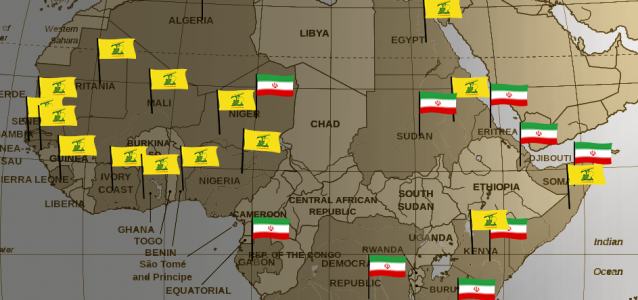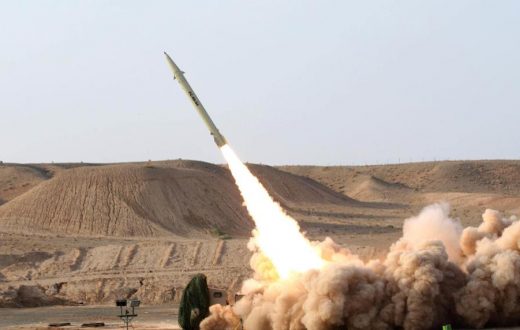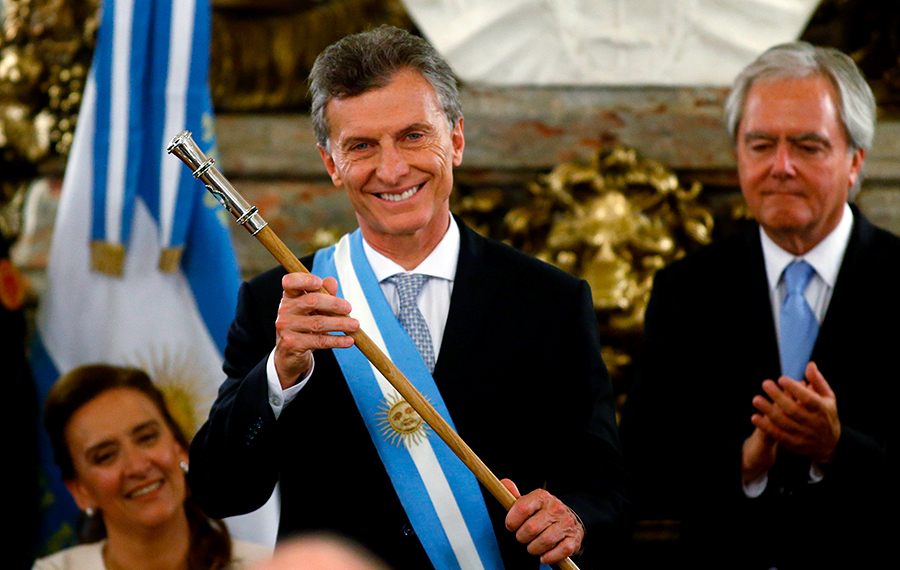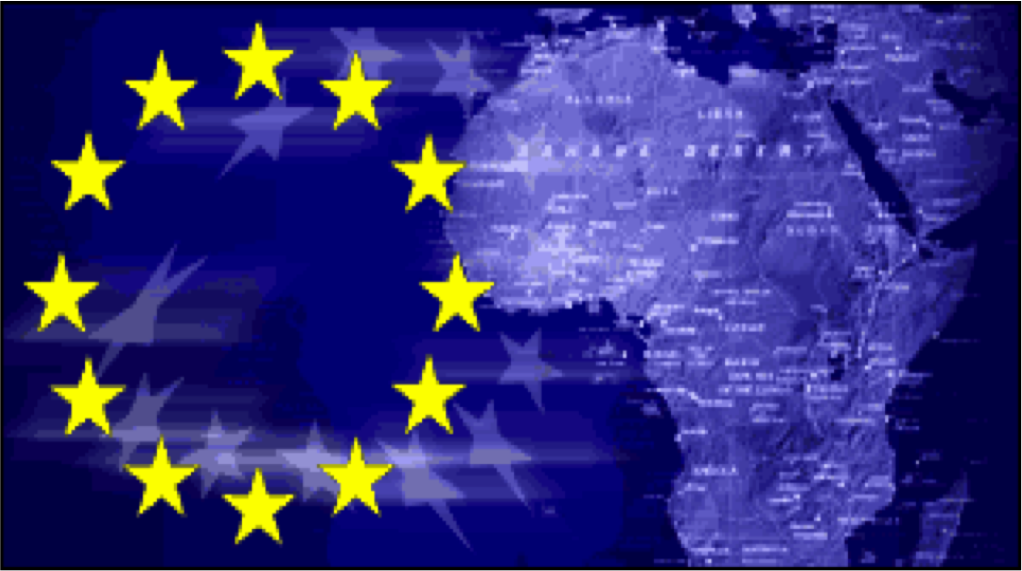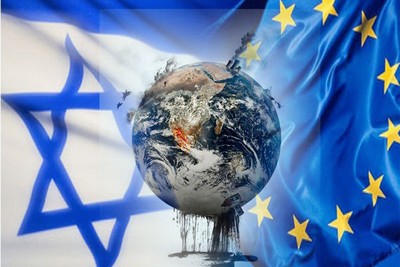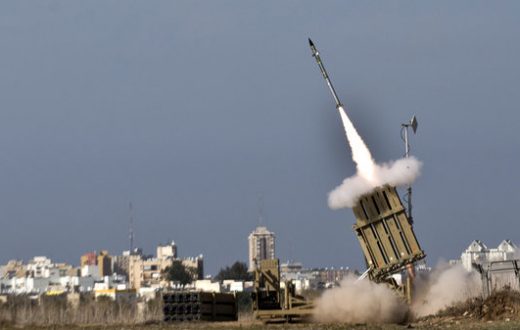Iran and Israel have taken their fight to the diplomatic arena in Africa. The Jewish State and the Shiite Theocracy are competing to win the favors of local rulers and their favors at the UN. Both country are diplomatically isolated and need to relieve diplomatic pressure on their countries. African Countries have become particularly important ignite a revival on the International Scene. More importandly Eastern Africa is an Area of Strategic Importance for both countries. The Leaders of Ethiopia , Eritrea, Sudan and South Sudan are increasingly being courted by Netanyahu and Rohani.
Both nations are sending politicians and business leaders across the continent to forge or revive contacts, clinching a string of deals ranging from arms and agriculture to promises of dams, oil and protection.Although not on the scale of the Cold War-era rivalries that saw Russia and the U.S. fight proxy wars in Africa, analysts say the continent is increasingly important to Iran and Israel and believe countries will take what is on offer from both sides. “The main battleground is the U.N., where Africa’s 53 votes can really add up,” said Eurasia Group’s Philippe de Pontet.
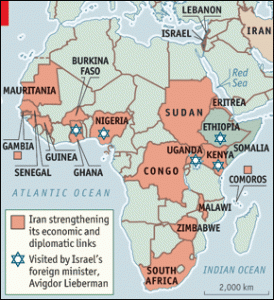
Credit :Crude Oil Daily
“This isn’t likely to take the form of an auction-like bidding contest, but increased financial diplomacy by both the suitors, including targeted investments and aid projects designed to curry favor,” de Pontet added. In 2010, the United Nations Security Council adopted a fourth round of sanctions on Iran over its refusal to suspend nuclear work, which the Shiite Theocracy says is peaceful but Western countries believe is cover for a weapons program. The 15-member Security Council included three African states — Gabon, Nigeria and Uganda, which all supported the sanctions.
VOTES AT THE UN
“The Shiite Theocracy is really using some of these African nations to balance its increasing isolation and, drawing from that, access markets. Africa is a fertile ground,” said Sanam Vakil at Johns Hopkins University’s School of Advanced International Studies.”It is not necessarily a successful strategy. But the Iranians are pragmatic. It is an insurance policy that may some day pay off,” she added.Despite failing to win support from the three African U.S. Security Council members in June’s sanctions vote, Ahmadinejad has been feted from Senegal to Zimbabwe and Iran has secured support for its nuclear program from some African countries.
Israel, too, has launched a charm offensive.
Once admired by African nations as a post-colonial success after its 1948 founding, Israel was cut off from dealings with many African countries after its 1967 occupation of land now sought by Palestinians. In the highest profile visit in decades, Foreign Minister Avigdor Lieberman and a batch of businessmen went on a five-nation tour of Africa in September last year, looking to drum up diplomatic support and business deals.
In terms of aid, the government touts its expertise in health and farming arid lands. Israeli businessmen also work in mining, security and telecommunications across the continent.
“(It is) a battle to constrain operations or groups that can be harbored and used against them,” Mark Schroeder, director of Sub-Saharan Africa analysis at Stratfor, a global intelligence company, said of Israel’s activity in Africa. In East Africa, Israel worries about Islamists in Somalia. In the West its concerns include the large Lebanese trading community which may make contributions to the militant group Hezbollah back home.
The Red Sea and Eastern Africa
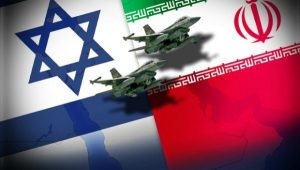
Credit : India Opines
The Shiite Democracy uses its naval presence in the region as a form of soft diplomacy to maintain good relations with Eritrea and Sudan (and, to a lesser extent, Djibouti) all while supporting its onshore goals in the region. Iranian tankers and other vessels, including military vessels, frequently dock at the Eritrean ports of Massawa and Assab and at Port Sudan. In 2008, Eritrean opposition figures even claimed that Eritrea had allowed Iran to establish a naval base at Assab, near the entrance to the Bab el Mandeb strait. Tehran has also used its relationship with Eritrea to aid Yemen’s al-Houthi rebels who, like the Iranians, are Shia (although the Yemeni rebels belong to a different sect).
Port Sudan’s proximity to Gaza, Egypt and Israel make it an excellent location for smuggling arms northward. In 2009, Israel launched three airstrikes against weapons shipments in Sudan that were believed to be from Iran heading toward Gaza. In 2011, Khartoum blamed Israel for another strike on Port Sudan that killed two people. Leaked cables also indicate that the West warned Khartoum not to allow Tehran to arm Hamas militants during the 2008-2009 Gaza War.
Since Tehran’s relations with Saudi Arabia and Yemen — on the northern coastlines of the Red Sea and Gulf of Aden — are sour, these ties to countries on the southern coastlines have become a strategic necessity for Iran’s ambitions beyond the Persian Gulf. Iran has been able to deploy more ships farther from the Gulf since 2007. For example, in 2011, for the first time since the 1979 Islamic Revolution, Iranian naval vessels passed through the Suez Canal. With Egypt’s new Islamist president seeking to work with Iran on a solution for Syria, Iran could gain greater access to Egyptian waters, especially as Cairo attempts to use Tehran as leverage to manage Israel.
Iran’s navy cannot project enough power to control key shipping lanes, but Tehran has emphasized its presence around Bab el Mandeb as a possible means of disrupting global trade in the event of an attack on Iran and a key point for negotiations in the future, much like the Strait of Hormuz.
Iran’s maritime presence also helps support anti-piracy operations in the Gulf of Aden and northwestern Indian Ocean. Iran’s navy has been a successful interdictor of Somali piracy since 2008, when Somali pirates hijacked an Iranian chartered cargo ship off the Yemeni coast. While countering piracy protects Iranian trade vessels from Somali pirates, it also provides a rationale for the Iranian navy’s presence off the coast of eastern Africa, allowing it to discreetly augment Iran’s activities on land, such as weapons trafficking through Sudan.

